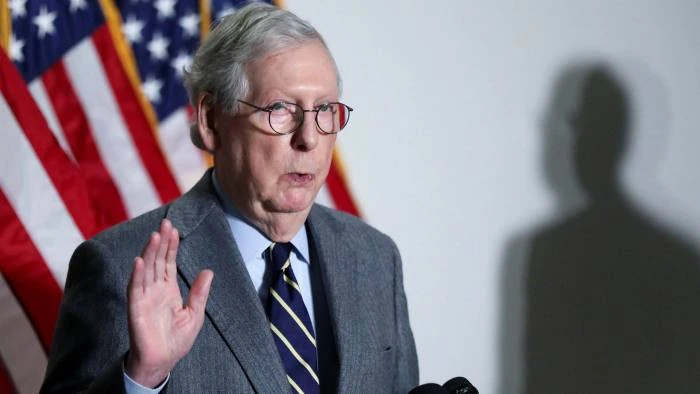
All but five of the 50 Republicans in the US Senate backed Donald Trump in a critical impeachment vote on Tuesday, suggesting the former president is unlikely to be convicted for inciting the violent insurrection on Capitol Hill.
Forty-five Republicans, including Senate minority leader Mitch McConnell, voted in favour of the “point of order” put forward by Rand Paul, the GOP senator from Kentucky, which stated that an impeachment trial would be unconstitutional because Mr Trump is no longer president.
Five Republican senators voted against Mr Paul’s motion: Susan Collins of Maine; Lisa Murkowski of Alaska; Mitt Romney of Utah; Ben Sasse of Nebraska; and Pat Toomey of Pennsylvania.
Explaining her decision, Ms Collins said: “I spent a great deal of time talking to constitutional scholars and other legal experts and concluded that the text of the constitution, the purpose of these provisions, and Senate precedent, all meant that the trial should go forward, especially since the House acted while the president was still in office.”
In a separate development on Tuesday evening, Patrick Leahy, the Democratic senator from Vermont who is set to preside over the trial, was taken to hospital after falling ill. A spokesperson for Mr Leahy, 80, said he had been admitted for evaluation “out of an abundance of caution”. He was later released from hospital after completing tests and sent home.
The vote on Tuesday will not stop the trial from taking place next month because the majority of the Democratic-controlled Senate rejected the point of order. But the result was welcomed by Republicans who have objected to impeachment proceedings against the now-former president. Seventeen Republican senators would need to vote against Mr Trump to convict him.
“It is one of the few times in Washington where a loss is actually a victory,” Mr Paul told reporters on Capitol Hill. “Forty-five votes means the impeachment trial is dead on arrival.”
The vote also renewed scrutiny of Mr McConnell, who was demoted to minority leader when the Senate switched hands to the Democrats last week. The Senate is now split 50-50, with Kamala Harris, the vice-president, able to cast a tiebreaking vote.
Mr Trump this month became the first president in US history to be impeached twice, when the House of Representatives, which is controlled by the Democrats, voted to charge him with inciting an insurrection for his role in the January 6 siege that left at least five people dead, including a Capitol police officer. All of the House Democrats backed the motion, as did 10 Republicans.
Chuck Schumer, the Democratic Senate majority leader, last week said he had struck a deal with Mr McConnell for an impeachment trial to begin in the upper chamber of Congress on February 9.
On Monday, House impeachment managers — Democratic lawmakers who will act as prosecutors in the trial — delivered the article of impeachment to the Senate, triggering the start of proceedings.
The following day, all 100 senators were sworn in as jurors before Mr Paul tabled his point of order.
Mr Trump stands to be the first former president tried in Senate impeachment proceedings, but several other federal officials have faced impeachment charges in the upper chamber of Congress after they left office.
Ms Collins said Tuesday’s vote made the former president’s conviction unlikely, given that two-thirds of the Senate would need to vote against him.
“I think it is pretty obvious from the vote today that is extraordinarily unlikely that the president will be convicted,” Ms Collins said. “Just do the math.”
Other Republicans were less certain. John Thune of South Dakota, who voted with Mr Paul, said: “I don’t think it binds anybody once the trial starts . . . I, like most, as a juror, am going to wait until the trial commences and hear the arguments on both sides.”
Mr Thune added that he thought Mr McConnell would take a similar approach.
Democrats were likewise determined for the trial to proceed.
“The pessimists may view that vote as the high watermark. But it is all before the evidence has been submitted to the jury, and before any of our Republican colleagues have to justify their vote publicly,” said Richard Blumenthal, the Democratic senator from Connecticut. “I continue to believe that those videos and Trump’s incendiary incitement will be very powerful.”





















